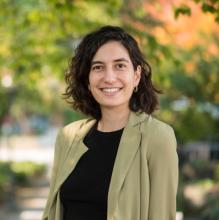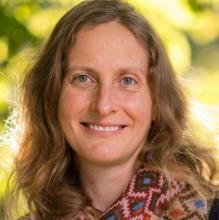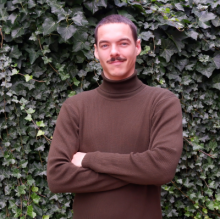Games are among the most popular media for consuming, and thus communicating, popular medievalism(s). My goal is to provide entertaining medieval and gaming content to a wide audience — including many who are interested in the Middle Ages, or history and literature more broadly, but are not involved in the relatively small sphere of scholarly medieval discourse. I hope to introduce new audiences to inspiring, strange, intriguing, diverse — simply different — ways of imagining and connecting with the medieval past.
Research Description
On Ubisoft Entertainment's official site for Assassin's Creed: Valhalla, the twelfth installment in the popular Assassin's Creed video game series, Ubisoft invites players to “become a legendary Viking raider . . . in England's Dark Ages.” This apparently harmless hook has inspired some unease among those of us who research the Middle Ages. You see, medievalists — scholars who research medieval history, art, economics, and so on — find the term “Dark Ages” grating. It conveys a myth, and not a good one: an inconvenient millennium of wanton violence, social and infrastructural decay, and excessive quantities of mud. Men battled and killed each other and, meanwhile, nothing of note really happened. (Often the Crusades get a nod, or the whole thing with the Antipope.) The light of imagination, “the Dark Ages” tell us, was out: nobody wrote, nobody thought very much, and all was filth and violence. Today, the type of world-building that fills this perceived cultural gap capitalizes on, rather than complicates, that general, Hobbesian sense of nastiness: fantasies of racial purity enforced by the blade, say, or of medieval society as a kind of brute-force-manliness club. Rather than depicting a wealth of medieval worlds, the popular idea of the Middle Ages becomes something more akin to a long, gory, worldwide pause centred myopically around certain parts of Europe. Exit humanity, pursued by trebuchets. The thing is, though, I still want to play Assassin’s Creed: Valhalla. It looks fun. Hence my project: playing video games in public as a medievalist. Games are among the most popular media for consuming, and thus communicating, popular medievalism(s). My goal is to provide entertaining medieval and gaming content to a wide audience — including many who are interested in the Middle Ages, or history and literature more broadly, but are not involved in the relatively small sphere of scholarly medieval discourse. I hope to introduce new audiences to inspiring, strange, intriguing, diverse — simply different — ways of imagining and connecting with the medieval past. Featuring other medievalists and industry experts, both in livestreams and pre-recorded video content, helps me present as many different ways of imagining the medieval past as possible. And ultimately, what I learn from and discuss with my guests, viewers, and chat will help me wrap up my dissertation with a short game of my own. Tl;dr — it’s informed, worldbuilding gaming.
What does being a Public Scholar mean to you?
There’s a certain stereotype of scholars as fundamentally isolated: working alone, researching in an ivory tower, harriedly but brilliantly publishing from amid teetering stacks of books. Scholars ourselves are susceptible to romanticizing this image — especially in the humanities, where labs are rare and sole authorship is the norm. In reality, scholarship is always collaborative, even within academia. (We might think of conference presentations and networking, for example.) Far from being a lone endeavour, scholarship is an ongoing conversation. I believe we shouldn’t limit who can participate in it, especially when it comes to imagining shared pasts that affect how we experience the world and tell stories about ourselves today. More people, from independent scholars to hobby enthusiasts, can and will take part in scholarship when it’s made accessible to them. I’m sure I’ve already tipped my hand, here, but I think that’s a good thing.
In what ways do you think the PhD experience can be re-imagined with the Public Scholars Initiative?
I’ve mentioned this cultural idea of academia as a vocation where people go off and be esoteric alone. That idea has shaped doctoral programs, which tend to follow a very linear and stepwise model: you work one-on-one with your supervisor to produce a dissertation that very few people will read. (Until and unless you publish it as a book or several articles, which a few more people may read.) Only after the dissertation do you (in theory) become an academic who professes to larger audiences. The doctoral degree ends up being somewhat performative: you create a piece of scholarship, one that’s taken so much time and care and expertise, just to show that you can create it. When scholars become, say, streamers or podcasters or YouTubers — when we become performers — our research ironically becomes less performative. It becomes fundamentally, rather than incidentally, communicative. For most doctoral students, the most social and publicly-oriented elements of our work — say, teaching or public outreach — are framed as separate from and secondary to research. The Public Scholars Initiative refutes that framework, allowing us to engage very widely with new publics in new and different ways.
How do you envision connecting your PhD work with broader career possibilities?
From early in my undergraduate degree, I’ve participated in knowledge translation: the process of taking work that is being done across different academic disciplines, integrating it, and communicating it to wider audiences. I’ve learned that knowledge translation has long been a core skill of academic research, and that recognizing and mobilizing its importance opens up new possibilities for connection and creation. I see these possibilities in communications, content creation, and new media. Meanwhile, doctoral programs have historically trained doctoral students to speak to a narrow audience in the context of a particular career path. I don’t think we should dispense with that skillset. Rather, by building on it to communicate widely with diverse communities, we can diversify our own thought and become more flexible in our abilities.
How does your research engage with the larger community and social partners?
Because I’m creating interactive content for a broad, general audience, community engagement is fundamental to my project. For example, commentary from live chat feeds is an intrinsic part of the streaming medium. The impact of this project will be determined by engagement from community members who attend the streams or otherwise engage with my content. Equally important to my community interaction, I think, will be my role in collaborating with other medievalists to chat about, and over, video games. There are already public-facing venues for medievalists, like the online magazine The Public Medievalist, and I see tremendous potential for multimedia collaboration and cross-promotion to spread the weird, wonderful joys of the Middle Ages.
Why did you decide to pursue a graduate degree?
I’ve been interested in pursuing a graduate degree in English literature(s) from a fairly young age. I spent several years after my MA, though, working in business communications. With the help of excellent mentors, I realized that I liked communications and had a knack for it, and could turn those skills to more broadly applicable subjects.
Why did you choose to come to British Columbia and study at UBC?
The Venn diagram of medievalists and gaming enthusiasts at UBC is closer to a circle than you might imagine. (Or, well, maybe it’s exactly what you might imagine.) Having done my undergraduate degree at UBC, I already knew what great mentors were available here in medieval studies. The English faculty at UBC also happen to be deeply engaged in public scholarship in a host of different ways — I’m not the first or only UBC medievalist to engage with video games or other pop medievalism in my work, for example.
Far from being a lone endeavour, scholarship is an ongoing conversation. I believe we shouldn’t limit who can participate in it, especially when it comes to imagining shared pasts that affect how we experience the world and tell stories about ourselves today. More people, from independent scholars to hobby enthusiasts, can and will take part in scholarship when it’s made accessible to them.




